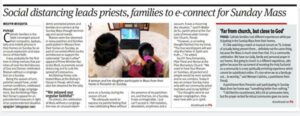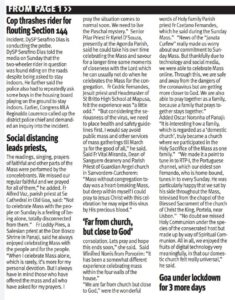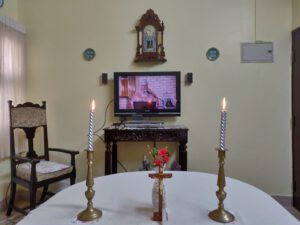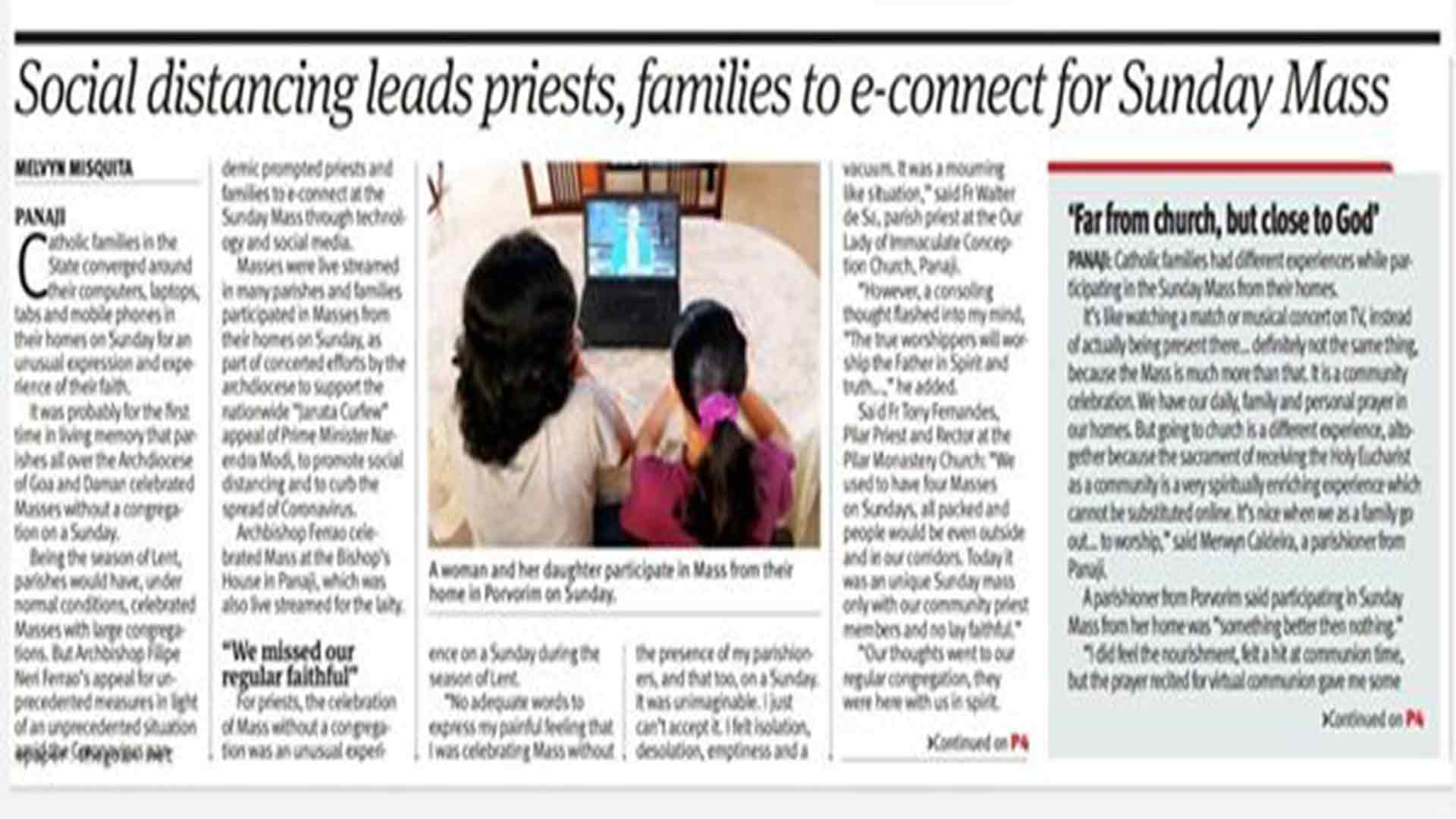First televised Mass fulfilling Sunday obligation
'How was your Mass on the fourth Sunday of Lent, 22 March 2020?' That's what my journalist friend Melvyn Mesquita of The Goan wanted to know. Here's what I said him about my experience of participating in a live streamed Mass yesterday....


“It is interesting how a family, which is regarded as a ‘domestic church’, truly became a church where we participated in the Holy Sacrifice of the Mass as one family.
“We made it a point to tune in to Rádio Televisão Portuguesa Internacional (RTP-i), the Portuguese channel, which our eldest son Fernando, who is home-bound, tunes in to every Sunday. He was particularly happy that we sat by his side throughout the Mass, televised from the chapel of the Blessed Sacrament of the church of Christ the King, Portela, near Lisbon.
“No doubt we missed Holy Communion under the species of the consecrated host but made up by way of Spiritual Communion. All in all, we enjoyed the fruits of digital technology very meaningfully, in that our domestic church felt really universal.” (The Goan, 23 March 2020)
For one, it felt quite odd to be attending Sunday Mass at home. Then, it was sad to see only a handful of people holding it for us in loco: the main celebrant, Mgr. Joaquim Mendes, auxiliary Bishop of Lisbon, two concelebrants, three readers and three gent choir members. The Bishop preached to an empty church, yet it was gratifying to see his message going across the globe.
Way back in the year 1940, Mgr. Fulton Sheen was one of the first priests whose Mass was televised. It was telecast by the experimental W2XBS, a CBS affiliated TV station. During the sermon, Sheen is known to have remarked, "This is the first religious television in the history of the world. Let therefore its first message be a tribute of thanks to God for giving the minds of our day the inspiration to unravel the secrets of the universe."
Some two decades ago I had a vicarious experience of a televised Mass, through a senior citizen in the Goan village of Benaulim. He would be seated, all suited and booted, before the TV, eager to fulfil his Sunday obligation in the comfort of his home, thanks to RTPi. Back then, his Sunday habit had evoked peals of laughter amid family and friends. It was only much later that I realized the idiot box legitimately fulfilled an earnest desire.
Eventually, the Eternal Word Television Network (EWTN) entered our home. More recently, some Christian channels started locally, and finally the Catholic Charismatic Renewal Television (CCRTV), modelled largely on EWTN, made its presence felt in Goa in December 2017. But it was only much later that I came to appreciate its benefits for the home-bound.
For example, our son Fernando, is a Sunday TV Mass goer. He waits to meet the Lord via television, whether or not a Eucharistic minister from Stella Maris chapel has administered him Holy Communion that morning. He has a touchingly respectful posture, which he sometimes finds difficult to adopt when he is at Mass amid a large congregation in a chapel or church. Something here disturbs him; but at home, left to himself or in company, he doesn't show any signs of irritation.

On the fourth Sunday of Lent this year, we prepared a table with an appropriate cover, placed a candle and a crucifix on it. We gathered as a family, appropriately dressed, and recited the prayers and responses, reflected on the readings and joined in singing the hymns. No electronic device other than the TV set was on, and no chores allowed. We focused on the Holy Eucharist, immersed ourselves in the presence of God and received Spiritual Communion. All that was in keeping with some guidelines for attending online Mass which I'd read and disseminated on social media the previous day.
Fulton Sheen was right. The daily message on several religious television stations in the world today is indeed "a tribute of thanks to God for giving the minds of our day the inspiration to unravel the secrets of the universe." Televised Mass fulfilling Sunday obligation and weekday Masses for habitués have come to stay after the first one on 23 March 2020. It is equally important, however, that regular church services begin at the earliest in God's own House, for lovely is the dwelling place of the Lord Almighty!
Ask not what our God can do for us...
LENT 2020 – Day 27
Is 65, 17-21; Ps 29, 2.4, 5-6, 11-12a. 13b; Jn 4, 43-54
God is not a politician; He keeps his word. However, we do not keep our word for we have become worse than that breed. What Isaiah prophesied would have become a reality if Israel had responded in earnest. Unfortunately, the Chosen People paid only lip service to God, as politicians do to their voters. For His part, God again and again invited them with love and promise – “not more shall be heard the sound of weeping and the cry of distress”, and He would graciously and mercifully forget their past offences. But they rejected the covenants and even the Son of God when He came down from Heaven.
“Not more shall be heard the sound of weeping and the cry of distress”: wouldn’t that be music to our ears in the present days of the Covid-19 pandemic? Well, nothing is impossible with God. He can create new heavens and a new earth; or at the end of the world, He might even leave the material planet untouched and therein simply place an entirely new race.
Meanwhile, why can’t we be that new race? What are we lacking in? We have the promise of God’s help; we only need to respond favourably. He has given us innumerable signs; we have only to acknowledge them humbly, as did the Galileans, after they saw all that Jesus had done in Jerusalem. In fact, they’d earlier witnessed His first miracle – the changing of water into wine – in Cana of Galilee. And now He healed the son of an official who entreated Him with faith; He did not put up His price, like the politicians do.
The world would be a better place had we accepted Jesus with all our heart. Even impostors enjoy acceptance whereas an authentic prophet has no honour in his own country. Similarly, we are ever-ready to receive blessings from the Lord. When will we begin to give Him of ourselves?

